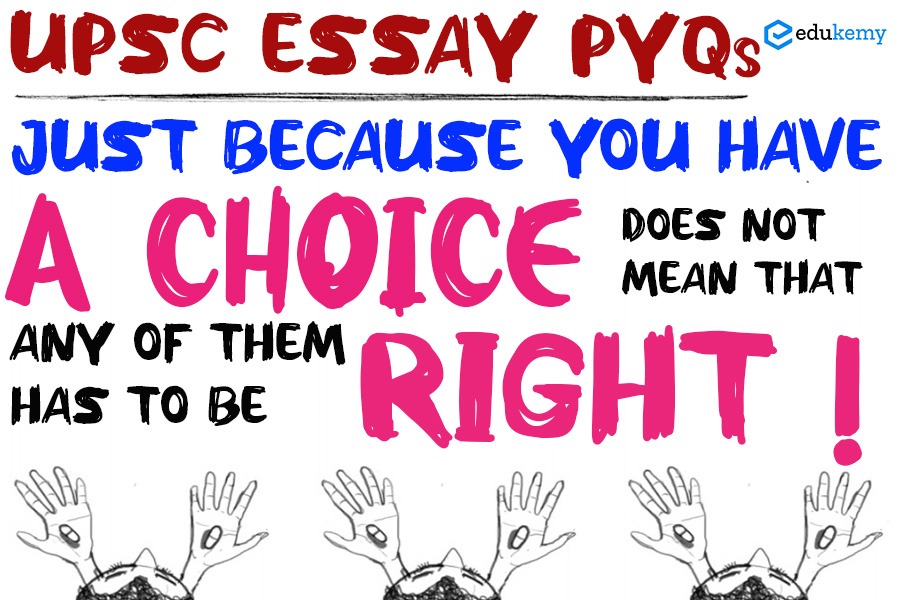Explore moral dilemmas, choice complexity, and ethical ambiguity in this analysis of the UPSC Essay PYQ 2022 topic on decision-making and rightness.
Contents
Essay Key
| Component | Details |
|---|---|
| Essay Topic | Just because you have a choice, it does not mean that any of them has to be right. |
| Paraphrase | This essay delves into the complexities of decision-making, emphasizing that simply having choices doesn’t always guarantee moral correctness or better outcomes. |
| Intent of the Essay | The objective is to examine the consequences of having choices, especially in moral and ethical situations, and how they can lead to dilemmas where no option feels justifiable. |
| Keywords | Choice, morality, dilemmas, ethical decision-making, consequences |
Key Arguments
1️⃣ Complexity of Choice
Choices often carry consequences that aren’t simply good or bad.
- People may encounter situations where every available option results in some negative outcome.
- 📚 Example: Philosophical ideas like utilitarianism suggest choosing what brings the most happiness, but identifying that option is often subjective and difficult.
2️⃣ Moral Ambiguity
The boundary between right and wrong isn’t always obvious.
- Many choices involve ethical gray areas, leading to dilemmas where each option can be morally questionable.
- 🧠 Example: The classic trolley problem illustrates how each decision can involve moral compromise, questioning the very idea of a ‘right’ choice.
3️⃣ Societal Influences on Decision-Making
Cultural norms and social expectations often shape what’s seen as the ‘right’ choice.
- People may feel pressured to conform, prioritizing socially accepted decisions over personal or ethical ones.
- 📊 Insight: Studies show that public opinion and group dynamics frequently influence personal choices, sometimes at the cost of individuality.
4️⃣ Psychological Factors in Choices
Mental biases and emotional states significantly affect how we decide.
- Biases like confirmation bias or emotional overwhelm can lead to decisions that feel right in the moment but are flawed.
- 🧪 Research: Psychological studies indicate that emotions can cloud logical thinking, resulting in poor decisions even when multiple options are available.
5️⃣ Existential Take on Freedom of Choice
Freedom to choose doesn’t always bring clarity—it can lead to anxiety and pressure.
- 🛍️ Example: In modern life, too many options—from careers to products—can create confusion and decision fatigue, rather than empowerment.
- Thinkers like Jean-Paul Sartre have highlighted how choice can become a burden, causing individuals to fear making the ‘wrong’ decision.
Case Studies/Examples
| Case Study | Key Insights | Relevance |
|---|---|---|
| The Trolley Problem | An exploration of moral dilemmas where choices are ethically fraught. | Highlights the complexity and ambiguity in moral choices. |
| Studies on Consumer Behavior | Examined how excessive choice can lead to dissatisfaction and regret. | Illustrates the psychological impact of having too many options. |
| Experiments on Groupthink | Investigated how group dynamics influence individual choices. | Shows how societal norms can dictate what is perceived as a ‘right’ choice. |

Additional Tips
- Examine how digital technology contributes to overwhelming people with too many choices in today’s world.
- Incorporate insights from behavioral economics to understand how individuals evaluate the value and appeal of having multiple options.
- Reflect on historical events where the idea of having choices led to disastrous or unintended consequences.
- Link the concept of choice to governance and policymaking, highlighting how collective decisions can shape major societal outcomes.

